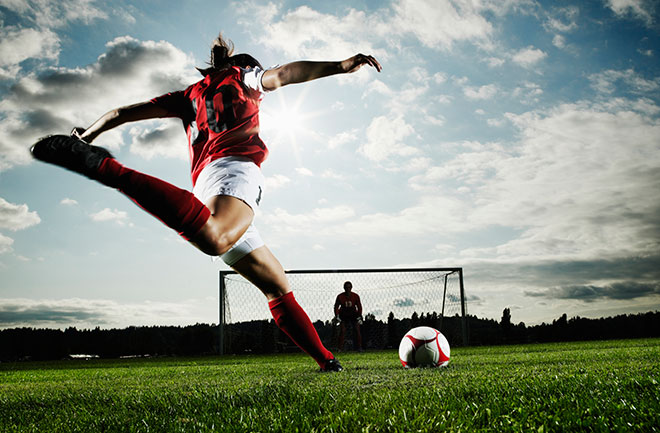| To answer this question one has to first define success. People define it in different ways such as earning a lot of money, having a lot of fans, playing for a big club or even enjoying playing. Since success means different things to different people it is not easy to define success in soccer. But we know that in order to become a professional soccer player you need to be able to play well enough that someone is willing to pay you to play. This in itself is success. But success is a process so success as a professional soccer player must also include the ability to continue to play well so that you can progress to the top of the profession. ESSENTIAL CHARACTERISTICS OF SUCCESS Everyone is different but there are a few common characteristics that are always present in successful professional soccer players. First, every player needs to have the technical skills to play the game, the ability to receive a pass, dribble a ball and combine with teammates. Second, there is the physical side so that you need pace, speed and power and be able to play even at the highest speed of play. Third, the mental side i.e. a commitment to improve always, quick decision making to fix different situations and the right attitude in not believing that you are too good. The importance of the right mental attitude is illustrated by the fact that some players have failed to achieve what their physical potential suggest they should. This is because they lacked the mental edge or 'killer instinct' to produce when it mattered. On the other hand, others exceed expectations because they approached training and competition with an attitude that gave them the extra 1% to win. PHYSIOLOGY AND THE MENTAL EDGE The question arises as to which component, the physical or the mental aspect, is more important in determining success. Scientists Ross Tucker and Jonathan Dugas researched the issue in the context of sport in general but the theory is the same in the case of soccer. They argue that the combination of the two determines success and without either it is not possible to reach the pinnacle of your sport. But what is the breakdown between the physical and mental components to success? Is it a 50 /50 breakdown or some other combination? Tucker and Dugas say that this is difficult to pin down because within each sport all the top athletes are different with different capabilities. In soccer for example Lionel Messi and Cristiano Ronaldo are considered the best players but Messi has better technical skills whereas Ronaldo is probably physically stronger. To decide who is better you need to rely on what Tucker and Dugas call the system of filtering. The nature of elite sports (including soccer) filters out those who lack what it takes at each level. An athlete who lacks talent is exposed as a junior and never goes further. Neither will one with abundant talent but lacks the mental edge or drive to train and compete well. In deciding who is better between top players like Messi and Ronaldo, you need to look at the totality of the talent of each. The contender will be filtered out and the ultimate winner will be the one who can find that extra 1% to outperform the other. That is as precise as science can get in measuring the physical and mental components of success (see The Science Of Sport - The Mental Edge Or Physiology-What Separates Champion From Contenders, Feb 25, 2010). GAME INTELLIGENCE As we have seen, being a successful soccer player requires physical ability and ball sense, but scientists at the Karolinska Institutet in Sweden have identified a third requirement called game intelligence i.e the ability to read the play, be at the right place at the right time and score goals. Scientists call this an example of executive functions - the ability to be immediately creative, see solutions to problems, change tactics rapidly and revise previous behavior that proved not to work. The methodology used to test executive functions were tests carried out on soccer players. They were found to perform much better in these tests than the general population. And players in the highest league achieved better results than those in the lower league. The results also show that the best players perform best on the test of executive functions. Torbjorn Vestberg, a member of the research group, foresees that psychological tests can one day become a tool to develop new and successful soccer players and to improve executive functions through training though he admits that probably there is a heredity component as well (Science News, Psychological Testing May Predict Success In Soccer, April 5, 2012). THE IMPORTANCE OF A SOCCER AGENT One last essential that a successful soccer player needs is having a soccer agent to help in the marketing of his talent. Hiring an agent at a young age is a vital move for many young players to increase their chances of making the grade. A skilled agent can negotiate the best possible opportunities and conditions on your behalf and help you to determine the proper career path or facilitate the best possible move in changing important clubs. It is clear that it takes a lot to become a successful professional soccer player. The intervention of science has helped us to better understand some of the physical and mental issues involved in such a complex topic. But there is still more to learn. My hope is that as our scientific knowledge increases it will help society to find and develop pools of soccer talent in easier and more economical ways. Victor A. Dixon July 7, 2013 Article Source: http://EzineArticles.com/7849016 |
0 Comments
|

